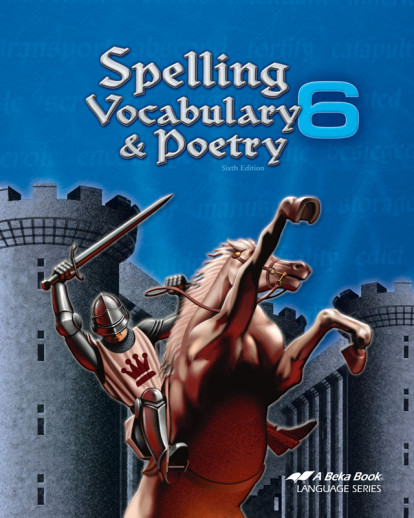We use cookies to make your experience better. To comply with the new e-Privacy directive, we need to ask for your consent to set the cookies. Learn more.
Spelling, Vocabulary and Poetry 6 Student (6th Edition)
Conquer the most commonly misspelled words and discover the origins of some English words with Spelling, Vocabulary, Poetry 6. This workbook includes 34 spelling lists that incorporate commonly misspelled words, vocabulary words with definitions, roots, prefixes, and suffixes. Lessons also include word exercises that help with proofreading, understanding, and spelling mastery. Eight poems are also included with favorites such as "The Charge of the Light Brigade," and "Paul Revere's Ride" to foster and appreciation for poetry within your child.
A component of the Abeka English program, you could use this convenient vocabulary with spelling program on its own. A schedule, including spelling and vocabulary (as well as poetry memorization), is in the main English/Language Arts Curriculum Lesson Plans for each grade level. The student book has seven lessons per quarter in spelling and vocabulary. Spelling lists feature 20 words each and vocabulary has 10 words each. At this level, the focus is more on vocabulary with definitions, synonyms, antonyms, and fill-in-the-blank exercises. Spelling lists include commonly misspelled words and serve mostly as review. The poems are part of the Abeka English program and are placed in this series for convenience. Each level has between 8 and 10 poems of varying lengths. You could use just the student book and teacher key, or add the quiz book & quiz key if you like. Overall, the lessons are short and to the point and won't take loads of time for your busy student to complete. The words selected are challenging and often promote a Christian theme. Grades 1-3 have spelling and poetry. Grades 4-12 have spelling, vocabulary & poetry. Spelling Charts show the word lists from all 30 lessons. They are large format and two-sided. More details about each level are found on the website.
At this level, the student book includes a list of words to study. Students learn 5-10 vocabulary words in their spelling lists. A short exercise in the student book practices the new vocabulary. The format here is different, however. Students are practicing writing the words on notebook paper instead of in the student book which is rather small. The teacher guide includes a sentence bank they will read from as the student then writes the words. For example, a student has a list including thief, Delaware, dangerous, etc. The teacher will read the word "thief", then add: "The thief was punished for stealing". Students are encouraged to practice their lists daily for the best retention. Reviews include selected words from several lists. Tests are available with a separate test answer key. Grade 4 has 34 lists, with 25-30 words each. Grade 5 has 34 lists, with 30-35 words each. Grade 6 has 34 lists, and a different format than grades 4 and 5. Grade 6 has more focus on vocabulary using roots/prefixes/suffixes. The poetry instruction includes a CD of the poems to help students memorize them. The CD is in the back of the teacher guide. Parents have lots of help to teach poetry with confidence. A complete schedule is found in the Language Arts 4, 5 & 6 teacher guides. There are no poetry tests.
Spelling, Vocabulary, and Poetry 6 teaches students the spelling and meaning of words through the study of prefixes, roots, and suffixes. There are eight review lists and exercises that provide opportunity for spelling mastery. Three spelling challenge lists allow them to learn commonly misspelled words that pertain to a specific spelling rule. There are eight poems written by well-known poets that will further develop the appreciation of good poetry through recitation and memorization.
| Product Format: | Paperback |
|---|---|
| Brand: | A Beka Book |
| Grade: | 6 |
| Length in Inches: | 10 |
| Width in Inches: | 8 |
| Height in Inches: | 0.1875 |
| Weight in Pounds: | 0.375 |

